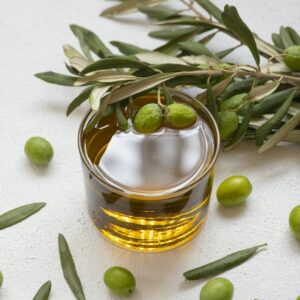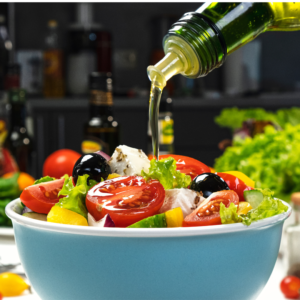Are Olive Oil Shots Good for You?
Olive oil shots are suddenly a “thing.” Celebrities such as Kourtney Kardashian, Beyonce, Gwyneth Paltrow, and Jennifer Lopez extol the virtues of swigging extra virgin olive oil. Lopez even based her JLo Beauty brand around the kitchen staple, claiming her age-defying looks were not the result of Botox or surgery, but the family beauty secret—moisturizing with olive oil.
Starbucks jumped on the olive oil bandwagon when their founder, Howard Schultz, was recently introduced to the daily Mediterranean custom of having a spoonful of olive oil. He was so inspired by the taste of olive oil with his morning coffee that he created a drink, Oleato, which is coffee infused with Partanna extra virgin olive oil.

So, is all this new excitement about olive oil a bunch of hype? Or have Americans been missing out on something Mediterraneans have known all along?
People in the Mediterranean have consumed lots of olive oil for centuries. It’s their primary added fat—no corn oil, vegetable oil, canola oil, or sunflower oil, just lots of olive oil. They put it on, and in, just about everything they eat.
For centuries, the Mediterranean diet, which is high in fruits and vegetables, has been known to promote health and longevity. The key component of this diet that’s missing in other diets—extra virgin olive oil.
While every vegetable has health-promoting compounds, the ones unique to olive oil, called phenols, are especially powerful. They benefit numerous health conditions, including heart disease and diabetes. Mary Flynn, a nutrition researcher and founder of the nonprofit Olive Oil Health Initiative at Brown University, believes “No food or medicine can do what olive oil can do.”
The phenols in extra virgin olive oil are antioxidants, capable of protecting the body’s cells from dangerous molecules, and they also have antimicrobial properties.
Extra virgin olive oil is simply the juice of the olive fruit, that’s been tested to meet quality standards such as not having a musty or rancid smell or taste. In Greece and Italy where olive trees have grown for thousands of years, oils were once extracted with hot water, applied after the fruit has been picked and crushed, a process that damaged some of the phenols. Manufacturers now use a process that involves spinning the olives in centrifuges using ambient temperatures which keeps the phenols intact. Oils processed this way bear the “extra virgin” label.
In areas where the Mediterranean diet is a staple, rates of many diseases are lower, and many researchers believe extra virgin olive oil is the reason why.
Let’s look at some of the research.
Heart Disease
A ten-year study of more than 12,000 people in Spain found that risk of dying from cardiovascular disease was half as high in people consuming one-and-a-half teaspoons of extra virgin olive oil daily. This was not the case for “refined” olive oil which was not extra virgin.
Another study found systolic blood pressure dropped after subjects took two tablespoons of olive oil a day for three weeks. Many people could probably get off blood pressure meds by replacing salad dressings and seed oils with extra virgin olive oil.

Breast Cancer
A study conducted in Spain randomly assigned 4,000 women to one of three forms of the Mediterranean diet—a low-fat plan, a plan supplemented with nuts, or a plan supplemented with extra virgin olive oil. The women who consumed the extra virgin olive oil reported the lowest rates of breast cancer during the five-year study.
Another study compared the eating habits of more than 1,000 Spanish women who had breast cancer with a similar group of cancer-free women. The study concluded that consuming more than two tablespoons of extra virgin olive oil daily offered the most protection against cancer.
Diabetes
More than a dozen randomized trials have demonstrated olive oil’s ability to reduce blood glucose levels. Researchers have found some evidence that olive oil’s antioxidants help reduce damage to the pancreas’ insulin producing cells.
Brain Function
Studies in mice have shown that extra virgin olive oil can strengthen brain functional networks and improve cognitive function. A randomized clinical trial in people with mild cognitive impairment found consumption of extra virgin olive oil can clear amyloid plaques associated with Alzheimer’s and improve cognitive function.
Weight Loss
A study conducted in 2010 randomized a group of breast cancer survivors to either a low-fat plant-based diet or a plant-based diet with three daily tablespoons of extra virgin olive oil. Twelve of the fifteen women who were given olive oil lost more than 5% of their body weight. Only four of the thirteen women on the low-fat diet lost more than 5% of their body weight.
The industrial seed oils that are so prevalent in just about everything we eat, such as safflower, sunflower, corn, and soy, have some serious problems. Most of them are manufactured in extreme heat and with all sorts of chemicals. They are subject to higher rates of oxidative reactions that make them harmful, not helpful to our health.
There’s also a misconception that you can’t cook well with extra virgin olive oil because it smokes at low temperature. It actually produces fewer unhealthy byproducts when heated compared to other oils.
Olive oil is one of the “good fats” we’ve been recommending in our Simple 9© nutritional program for a long time. It’s my go-to salad dressing. I use it to cook eggs and sauté vegetables. And yes, I take a tablespoon as a shot just about every day.
Olive oil is like wine. Different brands have different tastes based on the types of olives used and the regions where they were grown. I recommend you buy and keep more than one different kind on hand. And if you ever get to the Mediterranean, buy as much as you can and bring it home.
Stay Strong,
Bo Railey

